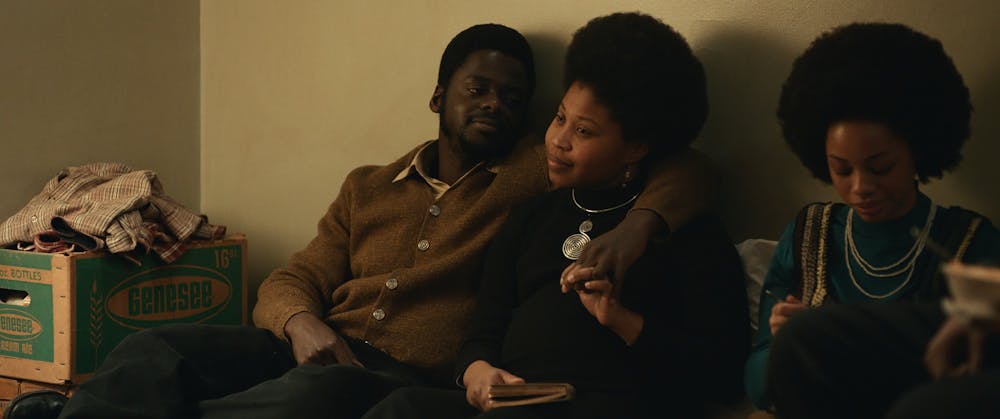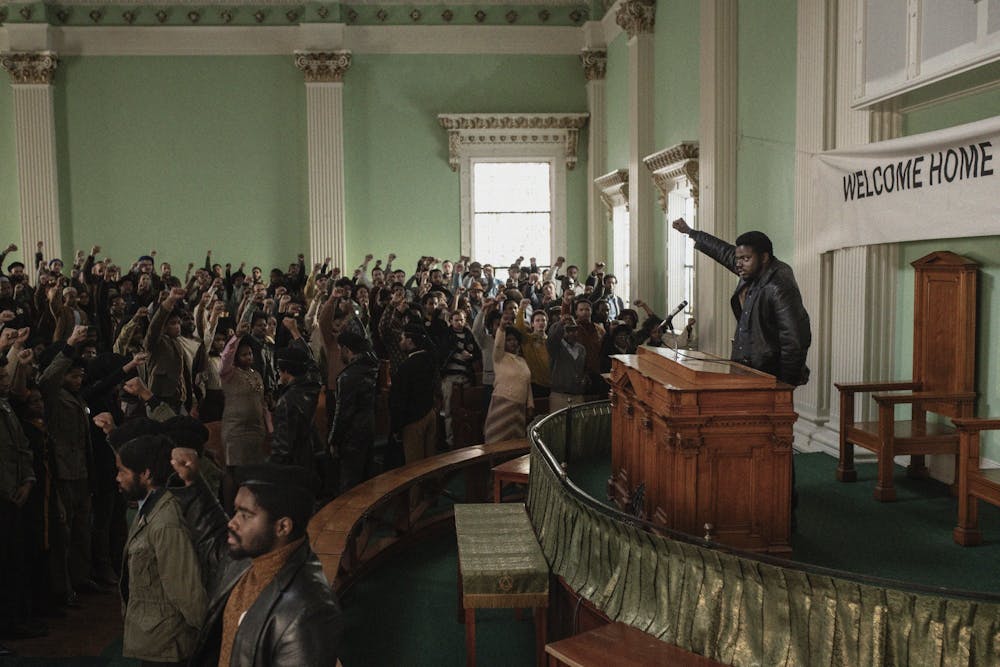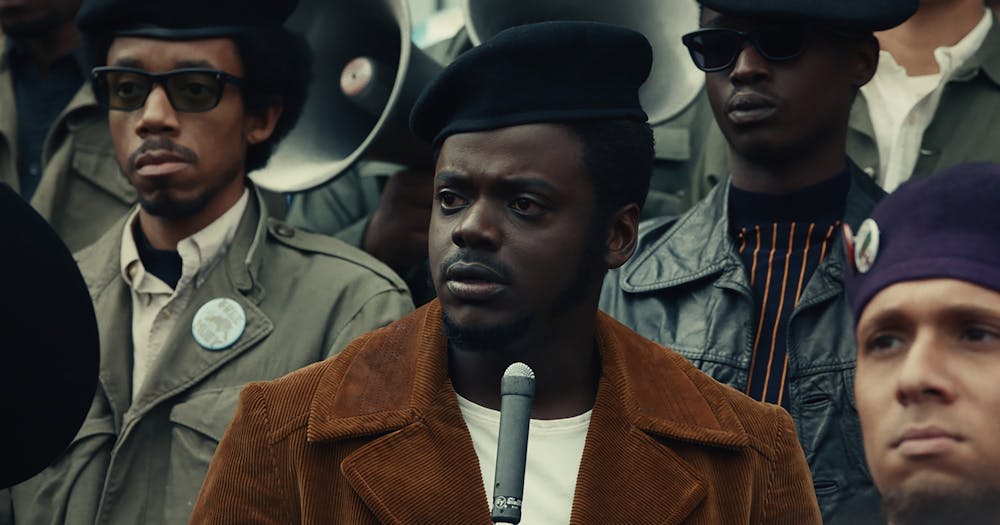February is Black History Month, and in the wake of recent protests and riots against police brutality, it’s vital that we honor it by educating ourselves and each other. When high school history classes reach the civil rights era, textbooks feature figures such as Martin Luther King, Jr. and sometimes Malcolm X, but gloss over hundreds of other Black pioneers and heroes. Most of us don't even learn about the Black Panther Party, which made strides forward for its communities but was vilified by the American government.
Director Shaka King’s Judas and the Black Messiah, which was released in mid–February, highlights the overlooked pieces of Black history. The film tells the story of Fred Hampton, who was chairman of the Illinois chapter of the Black Panther Party in the late 1960s, until his assassination by the United States government in 1969.
Street had the opportunity to attend a roundtable with the cast, including stars Daniel Kaluuya, LaKeith Stanfield, and Dominique Fishback, as well as Algee Smith, Darrell Britt–Gibson, and Dominique Thorne. Every actor spoke with the cadence and passion of a poet, leaving the attendees feeling empowered and in awe—even over Zoom.
The film begins with real historical footage of civil rights speeches, protests, and headlines, which set the scene for the audience: Chicago, 1968. Though Hampton, an ardent revolutionary played by the talented Kaluuya, draws the audience's attention whenever he's on screen, Judas and the Black Messiah centers its narrative on the man responsible for his death: William O'Neal, played by Stanfield.
Arrested for impersonating an FBI official, the real and fictional versions of O'Neal were threatened with jail time but presented with a deal: infiltrate the Black Panthers as an FBI informant and report back on a regular basis. Using O'Neal's information, the Chicago police raided Hampton's home and murdered him in his sleep. He was only 21.
Stanfield built his character by watching an hour–long, uncut version of the only interview O'Neal ever gave. The actor revealed that he didn't like his character at first, but he eventually noticed cracks in O'Neal's seemingly confident demeanor. Stanfield wanted to play up the character's insecurities. Rather than presenting O'Neal as a two–dimensional villain, he approached the character with empathy. In the film, William O'Neal is an anxious, self–centered young man facing a moral dilemma, making a series of wrong choices when backed into a corner, and digging himself deeper into the pit of deceit and discomfort.
Fishback, who played Hampton's partner Deborah Johnson, discussed how the cast consulted and tried to do right by Hampton's living family members. Akua Njeri (formerly Deborah Johnson) and their son Fred Hampton Jr. advised the actors through frequent set visits. Their involvement added a personal layer of authenticity to the cinematic story of Hampton's life.
Judas and the Black Messiah portrays Hampton as the multi–faceted person he was. In the film, he is both a passionate orator who incited revolutionary change, and a man who fell in love with a poet and was expecting to become a father. In one heart–wrenching scene, Johnson reads a poem about motherhood to Hampton—Fishback revealed that she wrote the poem herself, and that it was the trust she had with Kaluuya that enabled both to act with vulnerability.

Reflecting on balancing the different aspects of Hampton's character, as well as the responsibility of portraying a major leader of the civil rights movement, Kaluuya shared a saying about his acting methodology: "Show up, tell the truth, go home." Having the guidance of Hampton's family allowed Kaluuya to fully embody his character. Once that feeling possessed him, he revealed he couldn't portray the character any other way.
The cast harbors a deep connection with their roles and the story they tell together onscreen. They didn't just act the part—they became it, resulting in a performance and film that was both respectful to history and deeply impactful on its audience. Kaluuya recognized that there are elements of every character within all of us. We all want to love and be loved, and often it's the people we surround ourselves with that shape us.
Kaluuya wants audiences to know that Hampton was the "mouthpiece of a larger body," and without the body, there's no need for a mouthpiece. Anyone can make a difference. It's about creating a community with a sense of "oneness in terms of values and priorities," thus building a strong foundation from which voices will naturally flow.
Much of the cast revealed that they ultimately wanted the film to inspire conversation and change the future by telling a story from the past. Judas and the Black Messiah is a mirror in which we can see reflections of ourselves and our world. Just like Hampton, Breonna Taylor was murdered in her own home, showing that, despite decades passing, we are grappling with the same tragedies and systemic issues now as we were in the late '60s. The American government, and by extension law enforcement officers, still inflict violence on Black people every day.
Smith pointed out the blatant dehumanization of Black victims. In the film, Smith plays Jake Winters, a young Panther who dies in a violent police shootout. Winter's mother wants him to be remembered as the man he was, not just as a criminal. However, over 50 years later, the media still amplifies the flaws of Black victims rather than mourning the unjust loss.

The film shines a harsh spotlight on all the work we still have to do. Hampton's speeches reflect how progressive his ideas were decades ago. He discussed race inequality, classism, socialism, universal health care, and women's rights.
Smith, Britt–Gibson, and Thorne related the work of the Black Panthers to the youth they hope will watch the film: a generation of students with the potential to make a similar impact. They stressed the importance of educating yourself about civil rights leaders who are overlooked by the educational curriculum, as well as about modern–day injustices.
Britt–Gibson wants to know what the conversation around social equity will look like a year, two years, even ten years after the release of Judas and the Black Messiah. Though the film may be difficult to watch at times, he urges us to throw ourselves into an "ocean of uncomfortable conversations ... because that's where real change happens."
Even O'Neal, though he made immoral choices, can give us food for thought. Stanfield hinted that audience members may find themselves relating to O'Neal far more than they would like to. O'Neal took the route of self–preservation, but Hampton was the man of the people willing to put his life on the line for the communities he empowered—the titular Black Messiah. Thorne warned that choosing to be apolitical, as O'Neal tried to do, equates to being complicit in injustice.
Black History Month is about more than just celebrating and commemorating the past. It is about educating yourself on the violence and cruelty of past injustices and then applying that knowledge to better the world. Judas and the Black Messiah, with its compelling narrative, its balance of inevitable tragedy and inspirational hope, and its brilliant cast, doesn't only brings Hampton's story to life. It inspires audiences to share his tragically short–lived revolutionary fire and seek effective change.

